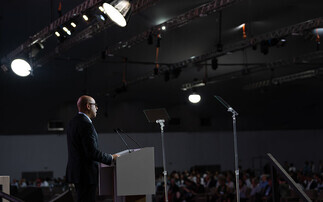A televised climate debate is democratically essential, but it is not without risks
TV debates are not without risks, and not just for the candidates.
There are good reasons why some within the environmental movement were a bit wary of signing up to the campaign for a televised election debate dedicated entirely to the climate and nature emergency. What precisely would it achieve, some asked privately, what is the goal here?
The risks are obvious. On one hand you could easily end up with under-briefed leaders enthusiastically agreeing with each other that 'yes, this is a crisis and something must, indeed, be done' for 90 minutes. On the other, by pitching leaders against each other on a topic where they fundamentally agree you risk pushing the climate debate still deeper into the hyper-partisan culture war, undermining the increasingly embattled political consensus on climate action which the UK - almost uniquely among English speaking nations - has managed to maintain thus far.
These fears are not without foundation. One of the reasons the Conservatives are so frit of agreeing to the debate is they know it will quickly turn into a pile on, as the other leaders attack the government's decidedly mixed environmental record and force the Prime Minister to defend policy plans that are not as ambitious as those put forward by the main opposition parties.
Add in the prospect of Nigel Farage espousing his nationalist flavoured climate scepticism and it is easy to see how tribal loyalties could result in right-leaning voters kicking back against the calls for bolder climate action. The risk that the debate turns into another notable milestone in the UK's descent towards US-style political partisanship is real.
And yet, the news Channel 4 is to host the UK's first dedicated leaders debate on climate change under the banner Emergency on Planet Earth - and is willing to empty chair the Prime Minister if necessary - is still very welcome. In fact, democracy demands nothing less.
The simple fact is that regardless of the slightly equivocal answers Boris Johnson and Jeremy Corbyn gave during this week's TV debate when they were given one minute to discuss whether climate change is the most important issue facing the UK, the climate crisis and our response to it is indeed the most important long term issue facing the UK. Brexit, for all its complexities and challenges, is ultimately about changing the UK's economic and political relationship with its nearest neighbours. It is a huge issue, but it has limits. The commitment from all the main parties to deliver a net zero emission economy by 2050 - before the vast majority of people under 40 have retired - is about transforming virtually every single component of our economy and infrastructure. There is no issue bigger, both at the existential, 'future of global civilisation' level, and at the practical, 'voters lives are going to be impacted' level.
The main Parties have recognised this reality in part at least, and have responded by delivering the greenest manifestos in British political history. And yet the implications of both their policy proposals and the reprioritisation of the environment as a top tier political issue have barely been discussed beyond the level of inane soundbite. It is right and proper that public service broadcasters and political leaders should seek to close this democratic deficit.
But if it is good news that the TV debate has been confirmed, how then can the organisers and participants ensure they sidestep the risks and seize the opportunities that are on offer. Because there are considerable upsides on offer, for both political leaders and, more importantly, the green economy and the UK's net zero transition.
Done right, the debate could be a hugely important teachable moment - a chance to finally explain to the British public the huge scale of the undertaking the UK has embarked on, to highlight both the epoch-shaping risks and the life-improving opportunities on offer, to engender a sense of shared national mission as the crucible of the world's first Industrial Revolution seeks to become a civilisation-saving hub for the 21st century's Green Industrial Revolution.
To achieve such a positive outcome it is critical that both the hosts and the participants recognise the purpose of a debate is not to humiliate your opponent or skewer people with 'gotcha' questions, but to coax the audience into agreeing with you. This topic is far too important - and across the main Parties there is too much agreement - for one minute answers, ill-informed questions, and playing to the gallery point-scoring.
What is needed is expert questions that cover the full breadth of the topic, time for both the big picture implications of life in a time of climate crisis and the policy detail of how we build a healthier, cleaner, net zero emission economy. The leaders must remember that not everyone agrees urgent climate action is needed and as such they have to make both the case for tackling this crisis and explain how lives and livelihoods can be enhanced as we decarbonise. Equally, they have to recognise that some voters are terrified about what the coming decades hold and are willing to do almost anything to raise the alarm. Their concerns have to be respected and engaged with.
This debate will be hugely revealing. As I've argued before climate sceptics make terrible leaders, but the opposite is also true. The empathy, powers of persuasion, long term strategising, and risk management required of true climate leaders makes for Prime Minister material.
There will be inevitable disagreement over the pace at which we should decarbonise, the policy levers that should be pulled, and the risks associated with driving the clean tech transition too slowly, or too fast. That is how it should be. The government should also be made to account for its record, which is exceptionally good in parts - offshore wind, a legal net zero target - and close to negligent in others - energy efficiency spending cuts, zero progress on transport emissions.
Overall, the true scale of the climate threat and the complexity of the net zero transition have to be the starting and ending point for the discussion. But there also has to be recognition that there are legitimate disagreements over the best way to build a net zero emission economy. With the exception of those who may turn up to reject scientific reality and harness climate fears to advance the cause of populist nationalism - Nigel, we're looking at you - is shoud be possible for political leaders to disagree on how to tackle the climate crisis in good faith.
It is vital this debate takes place and the Prime Minister owes it to the voters to take part, to defend his record and explain plans which, if he wins next month, will transform entire industries and revitalise the UK's standing in the world over the coming decade. But it is also critical the debate is conducted in a manner that genuinely informs the audience and underscores how all the UK's political leaders - bar one notable Trump-loving exception - are committed to transforming the economy beyond recognition inside 30 years.
It is supremely naïve to make the case for such a debate in the current electoral climate, but when it comes to global warming politics we need both heat and light.









